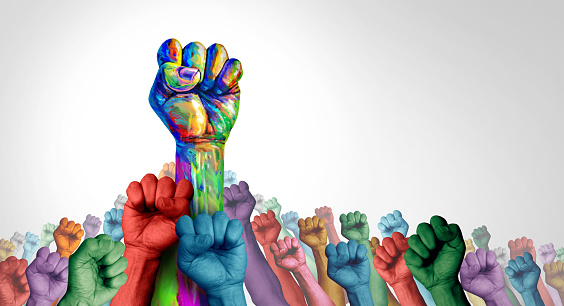Web 3 technologies have the potential to revolutionize the way we approach social justice and equality. By providing decentralized, transparent, and accessible systems, Web 3 can help address the systemic barriers that have prevented marginalized communities from fully participating in the social and economic spheres. In this article, we will explore the role of Web 3 in advancing social justice and equality, examining its potential benefits, applications, and challenges.
How Web 3 Technologies Can Advance Social Justice and Equality

Web 3 technologies, such as blockchain, decentralized applications (DApps), and smart contracts, have several features that make them well-suited for advancing social justice and equality. Some of these features include:
- Decentralization
Decentralization is one of the key features of Web 3 technologies. By removing centralized intermediaries, such as banks or governments, Web 3 can provide greater autonomy and control to individuals and communities. This can help address issues of inequality and injustice by giving marginalized communities more agency and power.
- Transparency
Transparency is another important feature of Web 3 technologies. With the use of blockchain technology, transactions can be recorded and verified in a secure and transparent manner. This can help promote accountability and reduce corruption, particularly in contexts where trust is low.
- Accessibility
Web 3 technologies can also improve accessibility to services and resources, particularly for marginalized communities. Decentralized applications can be developed to provide services in areas such as healthcare, education, or finance, without the need for intermediaries. This can help address issues of inequality and exclusion by providing greater access to resources and services.
Examples of Web 3 Applications in Advancing Social Justice and Equality
There are several examples of Web 3 applications that are already being used to advance social justice and equality. Some of these examples include:
- Education and Learning
Web 3 technologies can be used to provide greater access to education and learning resources. For example, the Knowledge Network platform uses blockchain technology to provide a decentralized, peer-to-peer learning network that is accessible to anyone with an internet connection.
- Healthcare and Wellness
Web 3 technologies can also be used to improve healthcare and wellness outcomes for marginalized communities. For example, the Healthcoin platform uses blockchain technology to incentivize healthy behaviors and improve access to healthcare services for underserved communities.
Financial Inclusion
Web 3 technologies can also help promote financial inclusion by providing access to decentralized financial services. For example, the MakerDAO platform provides a decentralized stablecoin that is accessible to anyone with an internet connection, without the need for intermediaries such as banks.
Challenges and Solutions in Using Web 3 for Social Justice and Equality
While Web 3 technologies have the potential to advance social justice and equality, there are also several challenges that need to be addressed. Some of these challenges include:
Digital Exclusion
One of the challenges of using Web 3 technologies for social justice and equality is the issue of digital exclusion. Not everyone may have access to the technology or the knowledge necessary to use it. To address this issue, Web 3 applications and services need to be designed with inclusivity in mind, with a focus on providing user-friendly interfaces and educational resources.
Bias and Discrimination
Another challenge is the potential for bias and discrimination in the design and implementation of Web 3 applications and services. For example, AI algorithms used in Web 3 applications may perpetuate bias and discrimination if they are not designed to be transparent and inclusive. To address this issue, developers and designers need to prioritize diversity and inclusion in the design and implementation of Web 3 technologies.
Cybersecurity
Finally, another challenge is the issue of cybersecurity. Web 3 technologies can be vulnerable to cyber attacks, which can have serious consequences for social justice and equality. To address this issue, Web 3 applications and services need to prioritize cybersecurity, with a focus on implementing robust security measures and protocols.
Environmental Sustainability
Web 3 technologies have the potential to play a significant role in advancing environmental sustainability. For example, blockchain-based platforms can be used to promote transparency and accountability in supply chains, enabling consumers to make more informed decisions about the environmental impact of the products they purchase. Additionally, Web 3 technologies can enable new forms of collective action, such as crowdfunding or community-driven initiatives, that can help address environmental challenges.
Digital Identity
Digital identity is an important issue in the context of social justice and equality. Web 3 technologies can enable individuals to have greater control over their digital identities, ensuring that they are secure, private, and inclusive. For example, decentralized identity systems can provide a more secure and transparent way for individuals to prove their identity, without the need for centralized intermediaries.
Smart Cities
Web 3 technologies can also play a significant role in advancing social justice and equality in the context of smart cities. By providing decentralized, transparent, and accessible systems, Web 3 can help ensure that the benefits of smart city technologies are distributed equitably among all members of the community. For example, blockchain-based platforms can be used to enable peer-to-peer energy trading, promoting greater energy democracy and reducing energy poverty.
Open Data
Open data is an important issue in the context of social justice and equality. Web 3 technologies can help promote greater access to open data, enabling individuals and communities to make more informed decisions about issues that affect their lives. Additionally, Web 3 technologies can enable new forms of data ownership and sharing, ensuring that the benefits of data are distributed more equitably.
Human Rights
Web 3 technologies can also play a significant role in advancing human rights. By providing decentralized, transparent, and accessible systems, Web 3 can help ensure that human rights are respected and protected. For example, blockchain-based platforms can be used to provide secure and transparent records of human rights abuses, ensuring that perpetrators are held accountable for their actions.
Decentralized Governance
Web 3 technologies can enable new forms of decentralized governance that promote greater transparency, accountability, and participation. For example, decentralized autonomous organizations (DAOs) can provide a more democratic and inclusive way for communities to make decisions and allocate resources.
Creative Industries
Web 3 technologies can also play a significant role in advancing social justice and equality in the creative industries, such as music, art, and literature. By providing decentralized, transparent, and accessible systems, Web 3 can help ensure that creators are fairly compensated for their work, and that the benefits of creative output are distributed more equitably among all members of society.
Privacy and Security
Privacy and security are important issues in the context of social justice and equality. Web 3 technologies can provide more secure and private systems for communication and data sharing, ensuring that individuals are able to exercise greater control over their personal information. Additionally, Web 3 technologies can enable new forms of secure and private financial transactions, promoting greater financial autonomy and reducing the risks of fraud and theft.
Community Development
Web 3 technologies can also enable new forms of community development that promote greater equity and inclusivity. For example, decentralized crowdfunding platforms can provide a more accessible and democratic way for communities to fund social projects and initiatives, while decentralized social networks can provide a more democratic and inclusive way for communities to connect and collaborate.
Digital Art and Culture
Web 3 technologies can also play a significant role in advancing social justice and equality in the context of digital art and culture. By providing decentralized, transparent, and accessible systems, Web 3 can help ensure that the benefits of digital art and culture are distributed more equitably among all members of society. Additionally, Web 3 technologies can enable new forms of collaboration and experimentation, promoting greater diversity and innovation in the creative industries.
Civic Tech
Web 3 technologies can also play a significant role in advancing social justice and equality in the context of civic tech. By providing decentralized, transparent, and accessible systems, Web 3 can help ensure that the benefits of civic tech are distributed more equitably among all members of society. Additionally, Web 3 technologies can enable new forms of citizen participation and collaboration, promoting greater democracy and accountability in government.
Supply Chain Transparency
Web 3 technologies can enable greater supply chain transparency, which can help address issues of social justice and equality in the context of labor rights and environmental sustainability. For example, blockchain-based platforms can be used to provide a more transparent and accountable record of supply chain transactions, ensuring that products are ethically sourced and produced.
Data Privacy
Data privacy is an important issue in the context of social justice and equality. Web 3 technologies can provide more secure and private systems for data sharing, ensuring that individuals are able to exercise greater control over their personal information. Additionally, Web 3 technologies can enable new forms of secure and private data sharing, promoting greater equity and inclusivity in the use of data.
Social Impact Investing
Web 3 technologies can also play a significant role in advancing social justice and equality in the context of social impact investing. By providing decentralized, transparent, and accessible systems, Web 3 can help ensure that social impact investments are distributed more equitably among all members of society. Additionally, Web 3 technologies can enable new forms of crowdfunding and peer-to-peer investment, promoting greater financial inclusion and equity.
Digital Democracy
Web 3 technologies can also enable new forms of digital democracy that promote greater transparency, accountability, and participation. For example, blockchain-based voting systems can provide a more secure and transparent way for citizens to participate in the political process, while decentralized decision-making platforms can enable more democratic and inclusive forms of decision-making.
Conclusion
Web 3 technologies have the potential to significantly advance social justice and equality by providing decentralized, transparent, and accessible systems. By removing centralized intermediaries, improving transparency and accountability, and promoting accessibility, Web 3 can help address systemic barriers to participation and inclusion. However, there are also several challenges that need to be addressed, such as digital exclusion, bias and discrimination, and cybersecurity. By prioritizing inclusivity, diversity, and security, we can help ensure that Web 3 technologies are used to promote social justice and equality for all.
I have over 10 years of experience in the Crypto industry and I have written dozens of articles on the subject. I am one of the leading experts in Cryptocurrency and my work has been featured in major publications such as Forbes, CoinDesk, and Bitcoin Magazine. I am also a regular contributor to CoinTelegraph and have been interviewed by numerous media outlets including CNBC, Bloomberg, and The Wall Street Journal. In addition to my writing, I am also an active investor in the space and have made successful investments in a number of projects including Ethereum, Bitcoin, and Litecoin.

